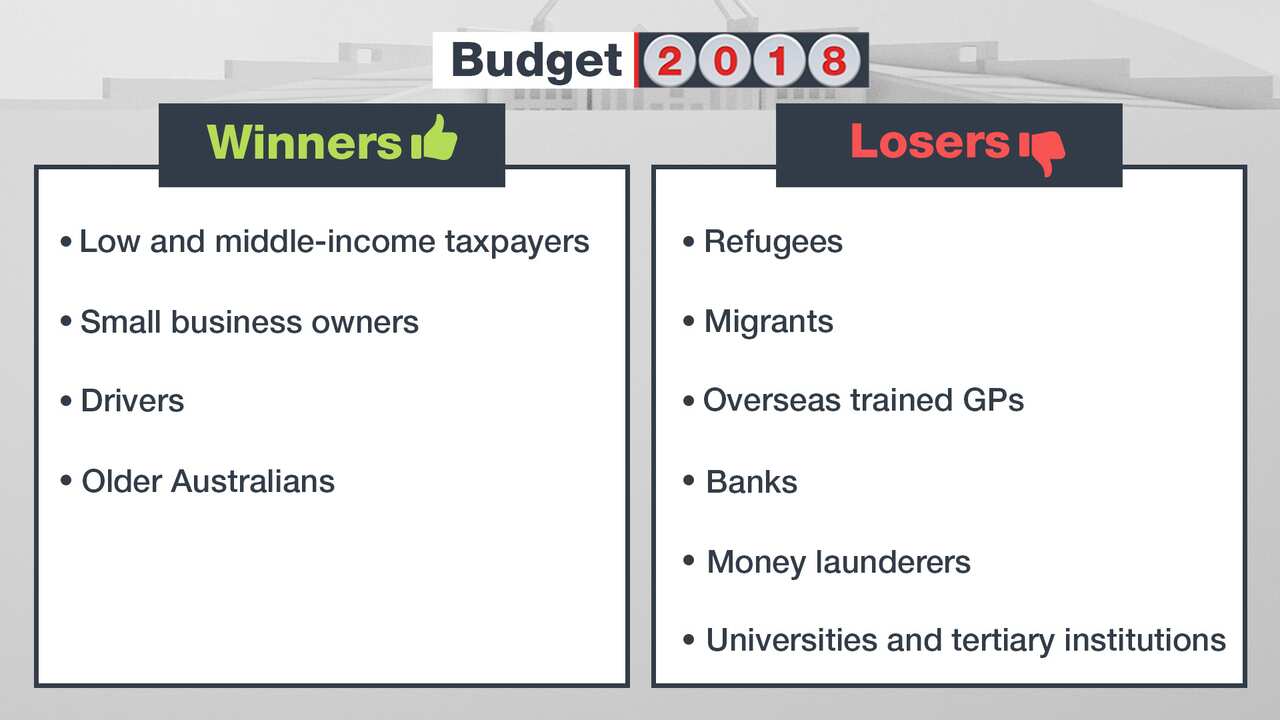Use our budget calculator to find out how you will be affected by this year's budget measures.
More on Budget 2018:
WINNERS
Low and middle-income taxpayers
- Up to 10 million workers will save up to $530 a year from 2018-19 under a new tax offset.
- More than 200,000 taxpayers won’t be paying 37 percent tax rate when the 2.5 percent tax bracket is lifted to those earning $90,000 from July 1, 2018.
- There’ll also be further measures to tackle bracket creep from 2022-2025, which will mean more Australians will be paying less tax under the 32.5 percent rate.
- By 2025, 94 percent of Australians will be paying the 32.5 percent tax rate.
Small business owners
- Will have another year to claim the $20,000 instant asset write-off, allowing them to deduct the cost of goods costing less than $20,000.
Drivers
- $1 billion urban congestion fund to fix “pinch points and improve traffic flow”.
Older Australians
- The number of home care places will be hiked by 14,000 over four years, costing $1.6 billion.
- Another $146 million will be spent on boosting access to aged care services for those in regional areas.
- Older Australians in aged care will also be able to draw from an $83 million fund to combat depression and loneliness. - All age pensioners can now access the Pension Loans Scheme, which will allow them to boost their retirement income by $17,800 for a couple without having their pension eligibility questioned.
- All age pensioners can now access the Pension Loans Scheme, which will allow them to boost their retirement income by $17,800 for a couple without having their pension eligibility questioned.

Source: SBS News
- Pensioners can also earn an additional $1300 a year without having their payments cut.
- Self-employed can now earn up to $7800 and still get the pension.

Refugees have been hit by this year's budget. Source: Getty Images
LOSERS
Refugees
- Will have to wait another 13 weeks – or a total of six months - to get help finding a job.
- Currently they wait 13 weeks to receive help from Jobactive, the government’s job services provider, but that is now being extended to 26 weeks after their arrival.
- The government says the waiting period will help them improve their English language skills.
Migrants
- Will have to wait four years instead of the current three years to access welfare payments from July 1, 2018.
- This will save the government $200 million over five years.
Overseas trained GPs
- The government will bring in 200 fewer doctors from overseas to save $400 million.
Banks
- Levy to continue and the Australian Financial Complaints Authority to start on November 1, and Banking Executive Accountability Regime on July 1.
Money launderers
- Outlawing large cash payments more than $10,000 made to businesses for goods and services from July 1, 2019. Transactions over a threshold will only be allowed through an electronic payment system or cheque. The government says this will tackle money laundering and tax evasion.
- A new hotline will also be set up allowing members of the public to dob in those engaging in money laundering or tax evasion.
Overseas hotel providers
- Will have to pay GST the same way as local providers from July 1, 2018.
Universities and tertiary institutions
- All HECS-HELP and FEE-HELP providers will have to pay an annual fee for the administration of the programs as well as the application process.

